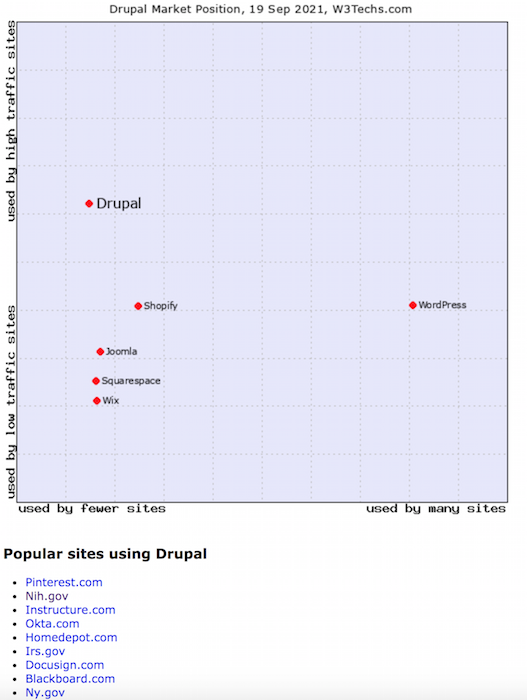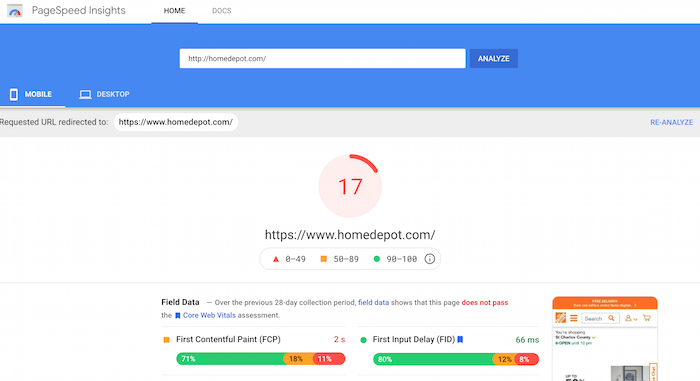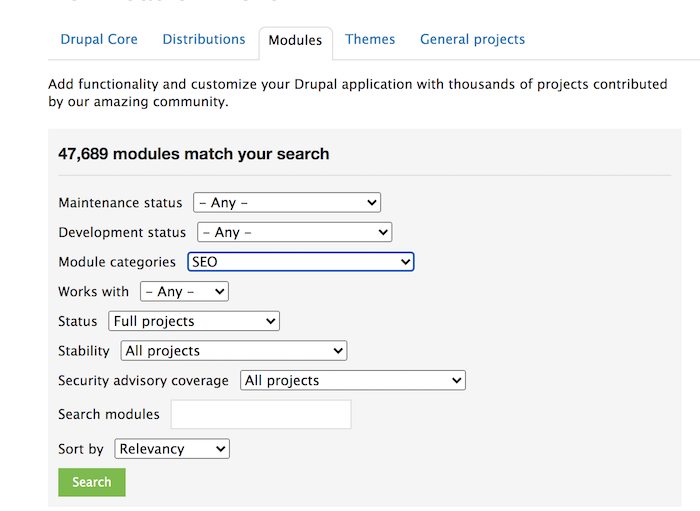
10 Best Practices for Drupal SEO
Focusing on Drupal SEO ensures the hard work you put into your site helps you actually reach customers. Like other platforms, Drupal has specific SEO features and strategies that ensure your changes are communicated from Drupal to search engines.
Whether you are using your Drupal website for e-commerce or building a content-driven brand, such as a membership site, Drupal SEO will help your customers find you as they search for answers online.
Being there, with the answers and resources they need, you’ll be able to build your brand following, grow sales or conversions, and hit your brand goals.
What Is Drupal?
Drupal is a CMS, or content management system. Formally, this is the software you use to create, organize, display, and interact with digital content. For everyday use, a CMS is a platform you’ve chosen to build your website on.
With a history of reliability, Drupal generally requires more technical knowledge and allows for far more customization than the plug and play options like Wix or Squarespace.
Like WordPress, you code certain items to create a website that looks and functions the way you need.
Pros and Cons of Drupal
Although Drupal is not the most popular website platform (that market share tends to be dominated by WordPress), it is used by a number of popular websites, such as Pinterest and DocuSign, that host a lot of users per day with very custom experiences, according to W3Techs.

Because it can be so well-customized, Drupal also requires a fair amount of tech expertise. You should have some knowledge of coding and basic CMS tools before you dive in.
Drupal is not a plug-and-play website CMS where you can merely choose a template and just type in the content you need throughout the website.
However, you can create the exact site you need using open-source information and tapping into the Drupal community.
Whether you are using your Drupal website for e-commerce or building a content-driven brand, such as a membership site, Drupal SEO will help your customers find you as they search for answers online.
What Kinds of Websites Should Use Drupal?
Drupal is a workhorse platform that hosts websites that need a lot of heavy lifting. As mentioned above, websites like Pinterest and DocuSign use Drupal.
What do those websites, and other Drupal sites, have in common?
- They host a LOT of digital data.
- They need their data to be easily searched and organized, both on a large scale and by individual users.
- They have members, with varying degrees of activity.
- They have a lot of users either logging in to interact or stopping by their website daily.
- They require unique functionality and features to reflect their brands.
- They need to stay up and running, so members can access their data.
- They need to be secure and respect privacy concerns.
This list should give you a picture of what makes Drupal very popular for some kinds of websites.
Drupal does the grunt work of supporting very large and very complicated websites, with iron-tight security and a reputation for reliability.
How do you make sure all those customers can find your Drupal website? Here’s how to do SEO on Drupal.
10 Best Practices for Drupal SEO
If you’ve invested in building a custom website, you want customers to find you on search engines. Drupal SEO is all about taking the steps to ensure your content can be crawled and seen by search engines and users alike.
1. Optimize Your URLs
Your URL is important for SEO. URLs with specific words that reflect the actual content of that page rank higher.
For Drupal SEO, you’ll have to go into your website settings and “enable clean URLs.” This will allow you to change URLs to reflect the individual page content, rather than a URL with randomized numbers and letters.
You can use a URL similar to the title of the page so the URL is more contextual. I strongly recommend including the main key term the page targets in your URL.
2. Speed Up Your Website
Slow websites don’t rank well on Google and other search engines.
It takes too long for a search engine to crawl a slow-moving website, and search engines don’t want to serve up a slow website to their audience. They are in the business of connecting users with websites they are glad to find.
When they are served up a fast-loading website, they are more pleased with the experience.
To check your site speed on Drupal, you can go to the performance area of your admin account.
You can also use Google PageSpeed Insights to analyze how well your site is doing. Here’s an example of what it shows for Home Depot, who uses Drupal.

3. Keep Your Website Secure
Search engines prioritize safety and privacy on the internet, so they give preference to secure websites.
If you’re not sure whether your Drupal website, or any website, is secure, you can look at the URL in your browser. The little “lock” icon and the “s” in https will tell you if a site is secure.
To secure your Drupal website, you can work with your hosting site. Note, that you may need to make certain URL updates if you are using Apache. See this Drupal documentation for that information.
4. Create Mobile Responsive Website
Search engines like Google prioritize mobile-friendly websites because so many searches are happening on mobile devices. Again, this goes back to wanting their customers to have the best experience.
One of the best ways to make sure your Drupal website is mobile-friendly is to make it responsive. Do images, text, and layout of your website morph depending on the size of your browser? Or is it a single static view no matter the size?
Improve your Drupal SEO by ensuring people can effectively access your content on whatever device they are using.
5. Use a Mobile-First Mentality
Drupal SEO for mobile doesn’t just mean responsive design. It’s also about creating content that is optimized for small devices and on-the-go access. This is a mobile-first design mindset, and it can shape your decisions as you create content and build your website.
A few things to keep in mind include:
- Use headings, bullet points, lists, and images to make content easier to scan.
- Create “stacked” designs, rather than side-by-side. In other words, think vertical instead of horizontal.
- Avoid adding too many popups that can disrupt the mobile experience.
Thinking about how your website looks on mobile can improve your SEO.
6. Ensure Website Accessibility
Another topic to explore with Drupal SEO is accessibility. Google and other websites weigh the accessibility features of a website when ranking websites in search results. They give priority to websites that check all the accessibility boxes, and deprioritize ones that lack compliance.
Accessibility is about how accessible your website is to people across a spectrum of experiences, abilities, and perspectives. This can include visual limitations, device and technology limitations, and more.
Websites that are more accessible can be accessed by a wide range of people. In essence, the more people who can access your website the better, and search engine websites reward you for that. It’s also just the right thing to do.
There are several Drupal tools you can use to assess how well your website is doing and identify the areas for improvement. Then you can go about making those changes.
7. Know Your Target Audience and What They’re Looking For
In addition to the technical specs we discussed, you also need to be aware of the content you create for your website. In particular, you need to clearly understand who you are trying to draw from those search engines.
Make sure you consider:
- Who is your target market?
- What are they looking for?
- How can you provide content that helps them?
Drupal SEO should focus on what your target is searching for and building great, long-form content around those topics. Because Drupal is known for the ability to host and support great amounts of data, this is your opportunity to be the storehouse of information on your particular topic.
However, you want to make sure you are actually creating content that drives the right target audience to your site so you have a better shot at turning them into customers.
8. Keyword Research
Incorporating relevant keywords into content and page copy allows you to draw your audience into your website and provide the information they need.
To ensure you are using the right keywords and phrases, you need to perform keyword research. While your intuition is a starting point, diving into what people actually search and the phrases they use can help your website appear higher in relevant searches.
You can use tools like Google Keyword Planner or Ubersuggest to build your keyword lists.
9. Use Keywords Naturally
Once you get a handle on the keywords that your target market is using, and what they are looking for, you can start to create content that draws them to your website.
This isn’t about trying to hack the system. The websites that optimize best are simply the websites that serve up content people care about on a regular website.
Once you’ve found your keywords, you need to incorporate them in natural and helpful ways. Sprinkling them throughout your content, using them in headlines, placing them in relevant URLs, and tucking them into page descriptions.
10. Find Drupal SEO Modules
With open-source coding, Drupal boasts a plethora of Drupal modules that people have created to serve the needs of Drupal users. Modules are software codes that others have made and tested, and are still improving, that you can try out too.
If you go to Drupal Modules, you can search for SEO ones in particular.

Here, you’ll find modules to add all sorts of SEO features, including meta tags, sitemaps, share buttons, and bread crumbs. These are one of the easiest ways to improve your Drupal SEO.
Drupal SEO Frequently Asked Questions
Is Drupal Good for SEO?
Drupal provides a robust platform that can be home to great SEO-friendly content and strategies. You can build an SEO-effective website on Drupal.
Is It Free to Optimize Drupal for SEO?
Optimizing for search engines, or SEO, consists of a series of best practices that help your Drupal site rank higher. These practices are free to do, but may require time investment.
Is Drupal “Dying?”
No, Drupal continues to be a popular platform for building websites. It is used by several big names including eBay, The Economist, and NCAA.
Is Drupal Hard to Use?
It is not beginner friendly. Drupal is very adaptable using basic coding techniques, and can be further customized with advanced technical knowledge. With open-source coding and an active community, Drupal users can find support and insights for building their sites.
What’s the Difference Between Drupal and WordPress?
Although WordPress boasts a larger share of the website market, Drupal has a history of reliability, security, and robustness. They are home to many big-name websites who require their membership level customization, data hosting prowess, and more.
{
“@context”: “https://schema.org”,
“@type”: “FAQPage”,
“mainEntity”: [
{
“@type”: “Question”,
“name”: “Is Drupal Good for SEO?”,
“acceptedAnswer”: {
“@type”: “Answer”,
“text”: ”
Drupal provides a robust platform that can be home to great SEO-friendly content and strategies. You can build an SEO-effective website on Drupal.
”
}
}
, {
“@type”: “Question”,
“name”: “Is It Free to Optimize Drupal for SEO?”,
“acceptedAnswer”: {
“@type”: “Answer”,
“text”: ”
Optimizing for search engines, or SEO, consists of a series of best practices that help your Drupal site rank higher. These practices are free to do, but may require time investment.
”
}
}
, {
“@type”: “Question”,
“name”: “Is Drupal “Dying?””,
“acceptedAnswer”: {
“@type”: “Answer”,
“text”: ”
No, Drupal continues to be a popular platform for building websites. It is used by several big names including eBay, The Economist, and NCAA.
”
}
}
, {
“@type”: “Question”,
“name”: “Is Drupal Hard to Use?”,
“acceptedAnswer”: {
“@type”: “Answer”,
“text”: ”
It is not beginner friendly. Drupal is very adaptable using basic coding techniques, and can be further customized with advanced technical knowledge. With open-source coding and an active community, Drupal users can find support and insights for building their sites.
”
}
}
, {
“@type”: “Question”,
“name”: “What’s the Difference Between Drupal and WordPress?”,
“acceptedAnswer”: {
“@type”: “Answer”,
“text”: ”
Although WordPress boasts a larger share of the website market, Drupal has a history of reliability, security, and robustness. They are home to many big-name websites who require their membership level customization, data hosting prowess, and more.
”
}
}
]
}
Drupal SEO: Conclusion
Drupal SEO comes down to using the tools available, along with basic SEO practices, to showcase your content and get in front of the right audience.
Start by implementing standard SEO best practices, like making sure you have HTTPS, checking site speed, and optimizing your URLs. Then, move on to Drupal SEO modules for more advanced features.
By taking the time to set your Drupal site up for success and build quality content that people want to consume, you can make the most of one of the most powerful platforms on the Internet.
Do you use Drupal? What are your favorite SEO modules?
